|
[ About Rafi ] [ Residence ] [ Articles ] [ Photo Album ] [ Lyrics ] [ awards ] [ Links ] [ Announce ] [ Mailing List ] [ Real Audio ] [ Download ] [ Feedback ] [ Requests ] [ E-Mail ] |
|

|
For those people, who don't know Mohd Rafi, I Quote that he is the
only legendary singer in Indian Film Music. Following is about his life, his birth, his
singing career etc..,
Rafi
was born on 24th Dec 1924 in Kotla Sultanpur [Pakistan] in Punjab, in a middle
class muslim family. His elder brother, Janab Hamid Sahab, was the first to take notice of
the divine gift in Rafi's coice. He decided to concentrate all his efforts in providing
all the support needed by his brother to make it big in the music world.
At
the age of seven, Rafi learnt Hindustani Classical music under the renowned Ustaad
Bade Gulam Ali Khan and Vahida Khan |
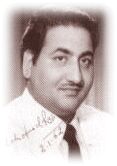 |
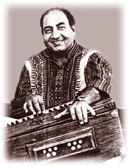
|
In
his life time, Mohd Rafi has sung more than 26,000 superhit songs.
Mohd Rafi started his career
at the age of 20, with a punjabi song, Soniye
Hiriye, teri yaad ne bahut sataya for the movie Gul Baloch, which was released on 28th
February, 1944. The producer was Sham Sunderji, who was very much impressed by Rafi's
style of singing and did not think twice on booking Rafi for all his future films. |
In 1944, Rafi was very famous as a singer. Many of his songs were sung by
youths and school-going kids. Rafi was invited by Nasir, a well-known actor of those times
to Bombay. From this point, there was no turning back. Rafi sang for Shamji Sundarji's
production Gaon Ki Gori. This
movie was also a great hit. With this hit, Rafi was called Play Back Singer. He was famous
and settled play back singer around 1948. |
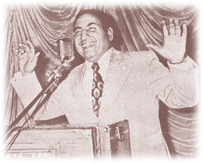 |
 |
K.L.Saigal
& Pandit Paulsikar had no words for Rafi's praise. When Mahatma Gandhi was
assassinated, Rafi sang a song Suno Suno Ay Duniya
Walon, Bapu ki Yeh Amar kahani written by Rajinder Krishan
and music by Hunslal Bhagatram, which touched everyone and was a great hit.
Whenever there used
be a fusion of Naushad's music, Shakeel Badayuni's lyrics and Rafi's voice, that number
would become super-duper hit. These three were quite a team then. Their songs were being
heard in all corner of the streets. In fact, those songs are still equally melodious now. |
|
Rafi had several opportunities to sing in public. The range of Rafi's
voice was very very high. This is noticeable from the number O
Duniya Ke Rakhwale from the movie Baiju Bawara. Naushad was very impressed by
Rafi's performance.
Rafi Sahab receiving the
National Rajat Kamal Award from President Sanjiva Reddy for his song 'Kya Hua Tera Vaada'
in the film 'Hum Kissise Kum Nahin' in 1977. |
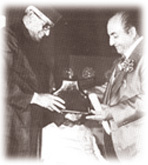 |
|
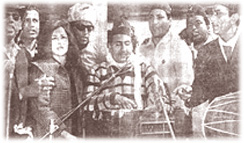 |
Rafi could sing any type of song. Let it be pop, qawali, bhajan, gazal,
romantic, rock'n'roll, light music, slow numbers, sad song, parody, fast numbers...,
anything he was remarkeable. He was the first to fit into the playback singer role in a
convincing way. His voice enhanced the brilliance of actors like Dilip Kumar. We could
feel Guru Dutt's heart beat when he sang Badi Dekhi Zamane Ki
Yaari. |
|
Rafi Sahab
was honored by the Indian Government in 1965 with the prestigious PadmaShree Award. Here
he is seen with President Zakhir Hussain at the award ceremony in New Delhi.
|
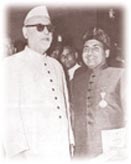 |
With the start of the famous
Binaca Geet Mala in 1952, the program aired the immortal songs of the film Baiju Bawra and
this really launched Rafi as a popular singer for all ages. Thousands of request for
Rafi's songs poured into Sri Lanka Radio. |
|
If he stylised his voice for the Dev Anand's mannerisms, he took
the job of instilling emotions in deadpans Suhani Raat Dal Chukhi in Dulari. |
It
would not be an exaggeration to say that actors like Shammi Kapoor owe their career to
this little man with the Voice of God.
No singer
at that time or even now in this era, can match Rafi. Rafi's singing style was so simple,
that nobody could imitate it. Even if they tried, they were not successful. His verstality
was very different and way too impressive. His contemporaries were either ineffective in
this front or were unwilling to compromize. |
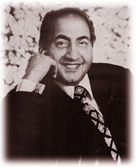 |
|
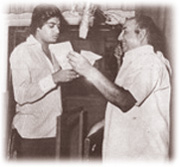 |
All this was about his singing carreer. But as a person, he was much more.
Rafi did not imitate any one nor did he stop any one from imitating him. Where there was
cut-throat pressure, Rafi was always totally with himself. Through out his carreer Rafi
has not been accused of anything. Nor did he stop any new singer from taking his position.
He was such a whole-hearted person, who would agree to sing for producers who could'nt
afford him in return to nothing. Listening to Rafi is like rowing down a river in a moonlit night. |
|
So, when your eyes focus and your finger points to the Rafi album
displayed on the colorful rack aligned along with Dhamakas and remixes, understand that it
is nothing unnatural, just the triumph of voice over noise.
Now, Rafi is
not amongst us, but that divine voice and soul will never fade from this earth. He was,
and remains, a major force in film music, the music of love, despair, hope, humor...etc.
Rafi's voice had the healing capability. His music is as calm, as raging, as deep, as
beautiful. It is the manifestation of the goodness and the divine. |
 |
|
|
[ About Rafi ] [ Residence ] [ Articles ] [ Photo Album ] [ Lyrics ] [ awards ] [ Links ] [ Announce ] [ Mailing List ] [ Real Audio ] [ Download ] [ Feedback ] [ Requests ] [ E-Mail ] |
|